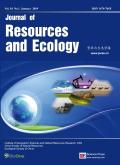A Wind Tunnel Study of the Shelter Effect of Different Vegetation Patterns of Caragana korshinskii
Q3 Environmental Science
引用次数: 0
Abstract
Windbreaks are important measures for reducing wind erosion in arid and semi-arid areas. A series of experiments were conducted in a wind tunnel to assess the effectiveness of different vegetation patterns (uniform, random, and cluster) of simulated Caragana korshinskii stands on wind speed. The uniform pattern provided a better shelter effect and was optimal at a density of 50%. The protected area and the wind reduction ratio increased and the downwind minimum wind speed decreased with an increase in the number of rows and a reduction in the belt's spacing. The locations of minimum wind speed (Xmin) were similar in arrangements with single-, two- and three-row belts. At the leeward distance close to vegetation (≤5 H, where H is the height of the plants), the efficiencies of vegetation patterns with high densities were greater than those of multiple-row belts and similar to those of multiple-belt shelterbelts; but at the leeward distance >5 H, the relationship was reversed. The single-row belt was the least effective, and the double-belt shelterbelt with belt spacing of 4 H was the most effective pattern. Multiple-belt shelterbelts had a lower downwind wind speed and a longer sheltering length than the other patterns, and so it is recommended windbreaks designed to reduce wind speed and control aeolian erosion in arid and semi-arid areas.柠条不同植被模式遮挡效应的风洞研究
防风林是干旱半干旱区减少风蚀的重要措施。通过风洞试验,研究了柠条人工林不同植被模式(均匀、随机、聚类)对风速的影响。均匀的格局提供了更好的遮蔽效果,并且在密度为50%时是最佳的。随着排数的增加和带间距的减小,保护地面积和风消减比增大,下风最小风速减小。最小风速(Xmin)的位置在单排带、二排带和三排带布置上是相似的。在接近植被的背风距离(≤5 H,其中H为植物高度),高密度植被格局的效率大于多排带,与多排防护林相似;但在背风距离>5 H时,关系相反。单排防护林效果最差,防护林间距为4 H的双带防护林效果最好。多带式防护林的下风向风速较低,防护林长度较长,因此建议在干旱半干旱区设计防风林,以降低风速和控制风蚀。
本文章由计算机程序翻译,如有差异,请以英文原文为准。
求助全文
约1分钟内获得全文
求助全文
来源期刊

Journal of Resources and Ecology
Environmental Science-Ecology
CiteScore
2.40
自引率
0.00%
发文量
107
 求助内容:
求助内容: 应助结果提醒方式:
应助结果提醒方式:


